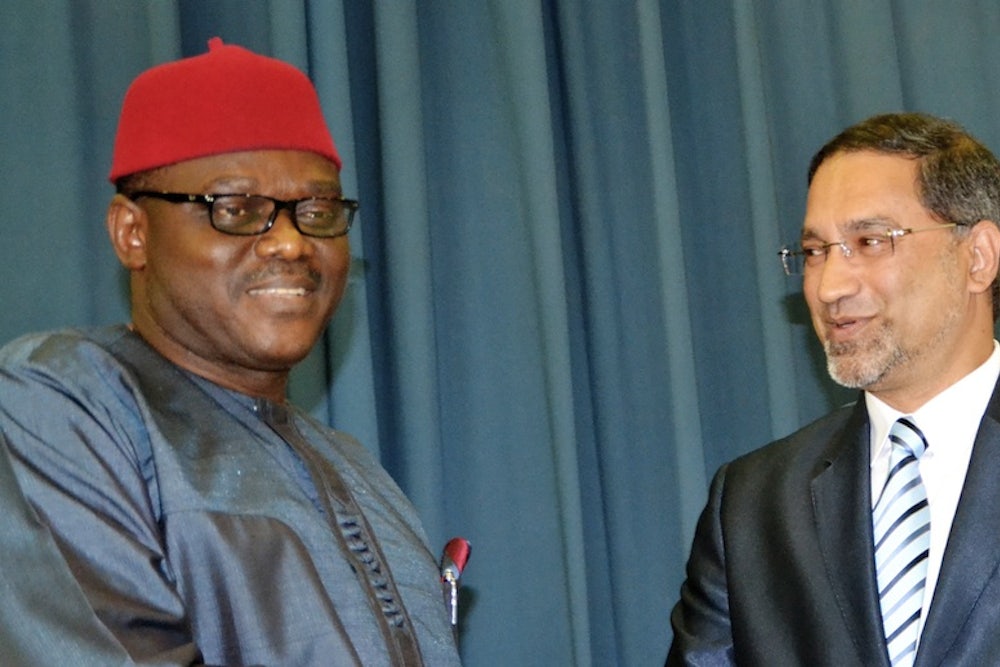The news about Ebola last week was relentless, depressing, and scary. On Monday the news was reassuring and even a little hopeful, thanks to a pair of key developments.
One was in Texas, where, according to authorities, more than 40 people who’d had possible contact with Thomas Duncan emerged from a 21-day waiting period with no signs of the disease. The group included Duncan’s fiancée, Louise Troh, and three other family members who had been with Duncan after he arrived in Dallas and fell sick. Federal and state officials are still monitoring more than 100 other people, mostly in Texas. So far, none have shown signs of the illness, although the last ones won't clear the 21-day period until early November.
The other development was in Nigeria, which World Health Organization officials declared “Ebola-free,” meaning it had been through two full incubation periods (basically, six weeks) without any new cases. Ebola had come to Nigeria the same way it came to the U.S.—through an infected international visitor. But Nigerian officials and health care workers (including one heroic physician, who later died) acted swiftly to isolate the sick and track down possible contacts. They didn't ban travel. Instead, they conducted some 18,500 in-person interviews, eventually identifying nearly 900 people who might have interacted directly or indirectly with the first infectious patient. In the end, Ebola infected just twenty people, killing eight of them.
Things could still get worse. New cases could still pop up in either the U.S. or Nigeria, whether it’s from somebody authorities are still watching (in the U.S.) or from some new visitor who slips through enhanced screening procedures. But the latest news is one more reason to dial back the Ebola panic, which by late last week had thoroughly suffused U.S. politics. While American officials got some things wrong, clearly, they also got some things right—both here and in Nigeria, where staff from the U.S. Centers for Disease Control were acting as key advisers. As Harold Pollack observed on Monday in Politico magazine, the available evidence suggests that the public health system, although not perfect, is working.
Of course, conditions remain dire in the three countries where the Ebola outbreak continues to spread: Guinea, Liberia, and Sierra Leone. One of the most poignant and harrowing reads of recent days came in the New York Times, where Pentagon correspondent Helene Cooper, Liberian by birth, wrote about returning to her home country. Two thousand people in that country have died already, many more are likely to follow. Yet Liberians, hardened by a 14-year-old civil war that killed 200,000, are coping with a mix of resignation and determination—because, as Cooper puts it, "there is no other alternative."
Another story in the Times mentioned that donations to charities working on Ebola haven’t exploded the way they have for natural disasters in the past. Meanwhile, global health officials are still begging developed countries to send more help. When it comes to what’s happening overseas, maybe Americans should panic a little more.
—Jonathan Cohn
News from Monday:
CLIMATE: September was the warmest on record. That’s the fourth consecutive month of breaking heat records and it’s a big reason that 2014 is on track to be the hottest year since scientists kept track of such things. (Andrea Thompson, Climate Central)
DOMESTIC VIOLENCE: The National Hockey League and Los Angeles Kings have suspended Slava Voynov, following an arrest on domestic violence charges. When another player was facing domestic violence charges last year, the league and the team allowed him to play while the case was under adjudication. Progress? (Eatie Strang, Arash Markazi, Craig Custance; ESPN.com)
2. Articles worth reading
Worst ad of the midterms. Brought to you by the increasingly desperate Republican Party of Michigan. We don't want to spoil it too much, but it includes a Sharknado. Dave Weigel has the story. (Bloomberg Politics)
Working class hero: Fed Chair Janet Yellen earned cheers and jeers last week for her speech on inequality. But can the Fed actually do anything to combat inequality? Jared Bernstein says yes. (Washington Post)
No smoking, no problem: CVS’s plan to stop selling tobacco products isn’t purely philanthropic. It’s also a money-making opportunity. Sarah Kliff explains why. (Vox)
Long read of the day: Hanna Rosin writes an unflinching portrait of a woman named Kelli Stapleton who tried to kill her violent, autistic daughter. It’s a story that will fog your moral compass. (New York)
Stories to watch
The Federal Open Markets Committee meets today and tomorrow and is expected to announce an end to its bond-buying program.
At QED
Rebecca Leber introduces the world's two worst climate villains, who are laughing while we burn up. It’s not who you think. Danny Vinik digs into a new paper on the minimum wage. The research offers new reasons to think that raising it won’t hurt job growth—in other words, that conservatives are wrong. Jonathan Cohn catches a prominent governor saying nice things about Obamacare. Oh, and he's a Republican. Yeah, fancy that.
